Reshaping health research through an equity lens
Dr. Teshager Kefale is a biochemist and synthetic biologist, dedicated to reshaping the landscape of health research and development through an equity lens.
He specializes in the fields of cancer research, biochemistry and synthetic biology.
Kefale has a master’s degree in biochemistry from the University of Calgary and a PhD in synthetic biology from the University of Waterloo.

During this fellowship, Kefale will be researching phagocytosis, the process by which certain cells engulf and destroy foreign particles or pathogens in the body, helping to defend against infections and maintain health. Unfortunately, pathogens like those that cause tuberculosis and malaria, which disproportionately affect Black communities, have evolved mechanisms to stop phagocytosis or hijack cells after phagocytosis to grow within cells. Kefale will lead research to understand the molecular and cellular processes used by these pathogens to hijack our cells, which will then help develop therapies to defeat these microbes.
This research provides an untapped opportunity to devise intervention for diseases that disproportionately affect the Black community.
“It’s an honour and also a responsibility [to receive this fellowship],” said Kefale. “It is giving me the opportunity to pursue what I’m really passionate about and to create impactful research for the Black community.”
“It also puts me in a position to be a role model for the next Black scholars. That really means a lot to me. I appreciate the commitment TMU has to foster inclusion and diversity in the university.”
Kefale is working under the guidance of his supervisor, Dr. Roberto Botelho, a professor in the Department of Chemistry and Biology and a Tier 2 Canada Research Chair in Organelle Function and Adaptation.
For Botelho, “it was a natural fit” to supervise Kefale. The two have worked together closely over the years through TMU’s MaRS Research Facilities’ as well as through Biofect Innovations (external link) , an award-winning start-up working towards the production of healthier, more sustainable proteins.
Kefale is the founder and chief technology officer of Biofect and Botelho acts as a scientific advisor.
Biofect’s mission is to elevate the health of the planet with conscientiously created ingredients—to accelerate the innovation of responsible food products with a lower carbon footprint.
“I'm a father now, I worry about the future after 50 years,” said Kefale. “I really want to be involved in creating a better future for my daughter and the generation after that.”
About the Postdoctoral Fellowships for Black Scholars
Black scholars are among the most underrepresented in post-doctoral and tenured faculty positions and university leadership. To address this and respond to recommendations of the (PDF file) Anti-Black Racism Campus Climate Review Report, TMU launched the Postdoctoral Fellowships for Black Scholars program in December 2022.
The fellowship was developed by the Faculty Working Group in collaboration with the Yeates School of Graduate and Postdoctoral Studies, and funded through the Presidential Implementation Committee to Confront Anti-Black Racism (PICCABR) and the Office of the Provost and Vice-President, Academic. The program seeks to expand and advance Black scholars and the Afro-centric intellectual traditions, support their academic endeavours, contribute to broader, meaningful inclusion of Black scholars, expand opportunities for research capacity in the institution and the wider community, and support career development and career readiness for Black scholars.
Over fifty applications were received from across Canada, with four fellowships awarded to Joseph Adu, Ashley Jane Lewis, Teshager Kefale and Esa Kerme.
Confronting Anti-Black Racism at TMU
This initiative is just one of many outcomes in response to the 14 recommendations of the
(PDF file) Anti-Black Racism Campus Climate Review Report, published by the Office of the Vice-President, Equity and Community Inclusion (OVPECI) in 2020.
The Presidential Implementation Committee to Confront Anti-Black Racism is a group of close to 50 dedicated individuals from across the university who have created action plans to implement those recommendations and cultivate Black flourishing on campus, and beyond. Learn about the report, the progress of recommendations and more on the university’s Confronting Anti-Black Racism website.